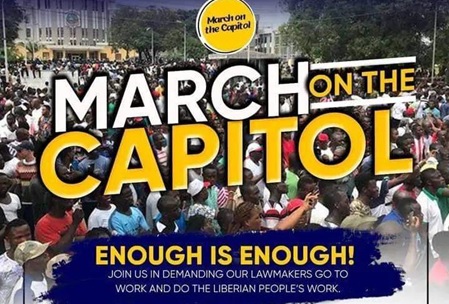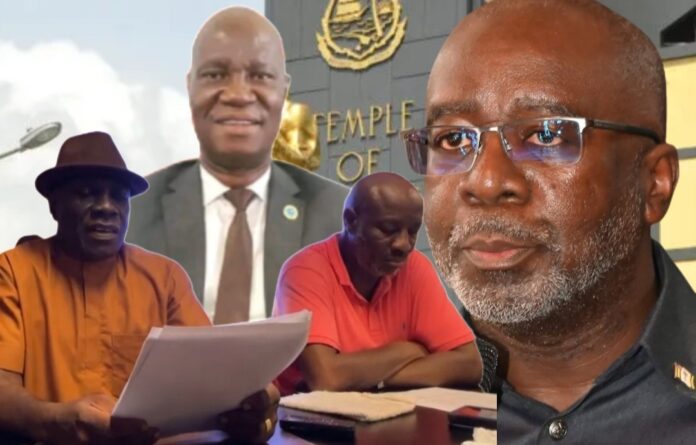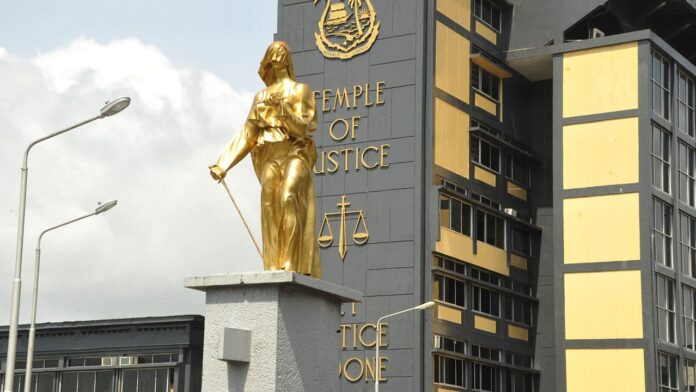Liberia’s history is marred by brutal periods of conflict, and the collective memory of that violence looms large over the nation’s present. For decades, political instability and brutal civil war redefined the scene, tearing apart communities and leaving wounds that have yet to fully heal. Now, in 2024, this historical trauma continues to shape the country’s path forward as Liberia faces a different kind of conflict: one that pits citizens against their leaders in a battle over governance, transparency, and accountability. But as protesters gather for the “March on the Capitol,” led by activist Vandalark R. Patricks, there is a critical question at play—does this protest serve the Liberian people, or does it mask ulterior political motives?
Patricks, an outspoken political commentator, calls on Liberians to engage in a peaceful protest, explicitly disavowing violence. He urges participants to rally as “law-abiding citizens” and reminds them of Liberia’s violent history, underscoring the importance of non-violent expression. In a statement on Tuesday, Patricks emphasized that “those who think violence can solve problems will be defeated,” invoking a commitment to peace and constitutionality as driving principles for the demonstration. His message carries weight, particularly given Liberia’s difficult history, but as protesters march toward the Capitol, their motives—and the broader impact of their actions—remain a matter of debate.
At the heart of the protest lies a desire, as Patricks puts it, to “restore constitutional order” in the House of Representatives (HOR) and compel lawmakers to focus on the needs of the Liberian people. Yet, beyond this noble goal, the motivations of the protest organizers have raised questions among political observers. Is the movement truly about protecting Liberia’s democracy, or is it a veiled attempt to shield a political ally?
Some speculate that the protest is less about reform and more about defending Speaker Fonati Koffa, who has recently faced calls for removal by a faction of majority lawmakers. The Speaker has enjoyed a complex reputation in Liberian politics, with both critics and supporters debating his contributions to governance. But for Patricks and his allies, the “March on the Capitol” represents a chance to challenge what they view as unjust and politically motivated attempts to unseat Koffa. This leads to speculation that the protest may be designed to protect not just the broader principles of constitutional governance, but a specific “political godfather”—an influential figure who could be pivotal to the political interests of protest organizers.
Does Political Protest Benefit Liberia?
Protests can serve as powerful catalysts for change, but they can also serve as instruments of political manipulation. When genuine grassroots movements arise, they create avenues for citizens to demand accountability and improvements. Liberia has experienced this positive impact in the past, where public outcry has led to notable changes in governance and public policy. However, protests that stem from political allegiances rather than civic duty may fail to genuinely address the needs of the people.
As two international monitoring groups arrive to observe the protest, there is an implicit acknowledgment of the high stakes involved. This external scrutiny brings both legitimacy and pressure to the marchers, suggesting that any deviation into violence or chaos would undermine the cause. Patricks’s emphasis on a lawful, non-violent approach suggests an awareness of Liberia’s precarious political stability and the importance of demonstrating responsible citizenship. For those in Paynesville City and Margibi County, who have been called upon to gather en masse and escort lawmakers from their hotels, the message is clear—this protest is about Liberia’s constitutional order and accountability.
However, skeptics argue that by rallying citizens under the banner of restoring “constitutional order,” the organizers may be trying to sway public sentiment in favor of Koffa, positioning him as a victim of political machinations rather than addressing the broader legislative dysfunction. While the call for lawful protest is encouraging, the emphasis on Koffa’s struggle for power risks sidelining the very issues of governance and reform that organizers claim to champion. For some Liberians, the protest appears to be less about advancing collective rights and more about bolstering the Speaker’s standing within the political establishment.
Who Stands to Benefit?
The outcome of the “March on the Capitol” will reveal much about its true objectives. If the protest remains peaceful and achieves concrete legislative outcomes, it could strengthen Liberia’s democratic institutions by setting a precedent for non-violent political advocacy. In that case, the protest would benefit not just Speaker Koffa, but the Liberian people as a whole, as it would demonstrate that citizens can successfully hold their leaders accountable without resorting to violence.
On the other hand, if the march devolves into a spectacle focused primarily on shielding the Speaker from criticism or seeking retribution against his detractors, it risks deepening existing political divides without addressing Liberia’s structural problems. In this scenario, the protest may ultimately benefit only a small political faction rather than advancing the welfare of the nation.
For now, the intent and impact of the “March on the Capitol” remain uncertain. Patricks’s rhetoric of peace and constitutional order resonates in a nation haunted by its past, but the protest’s alignment with a specific political figure raises questions about its motivations. As Liberians take to the streets, the success of the march will be measured not only by its turnout and media attention but by its lasting effects on Liberia’s political scene. If it delivers meaningful reform and reinvigorates faith in the democratic process, it could mark a turning point. If it merely props up one political player at the expense of broader progress, it risks becoming yet another chapter in Liberia’s fraught political history.
In a country still healing from its scars, Liberia deserves protests that are truly for the people—not those thinly veiled as political power plays.







